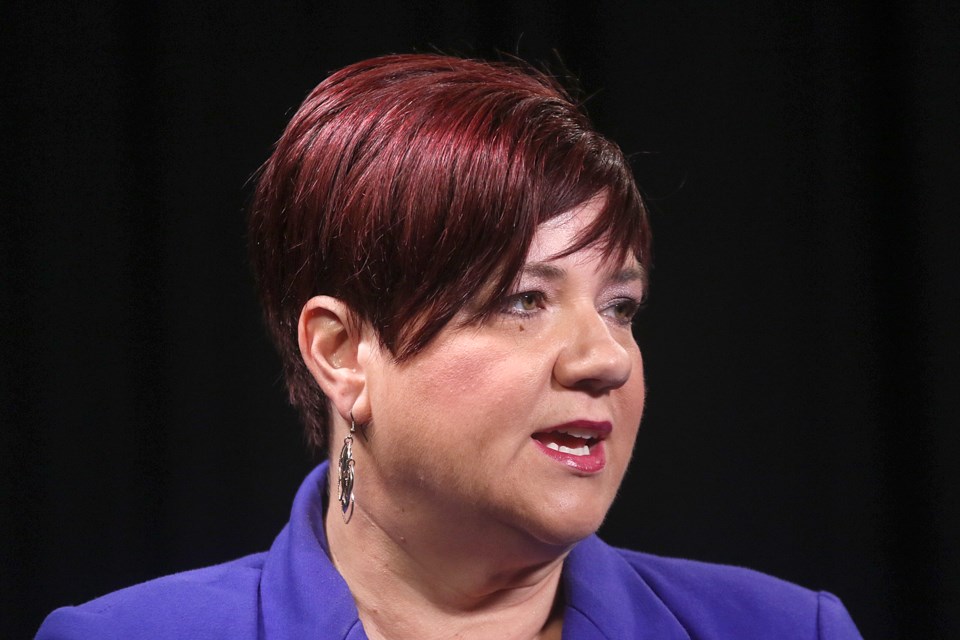THUNDER BAY - The chair of the Thunder Bay Police Services Board, Kristen Oliver, says change does not happen overnight, but she remains confident the police service will regain the trust of the Indigenous community despite more sudden deaths of Indigenous people being recommended for review, ongoing investigations by the Ontario Civilian Police Commission and Ontario Provincial Police into the service, and even calls that the service be disbanded.
“I’m an optimist. I think with concrete policies and plans in place that demonstrate clearly to Indigenous communities and leadership that we are taking this seriously,” Oliver said. “I don’t particularly agree that the police service should be disbanded.”
Oliver held a media conference to address the findings of a recent report of the executive governance committee on the reinvestigation into nine sudden deaths involving Indigenous people in the city of Thunder Bay.
The reinvestigations were part of the 44 recommendations handed down in Office of the Independent Police Review Director, Gerry McNeilly’s 2018 Broken Trust report, which found systemic racism at an institutional level in the service.
The report by the executive governance committee found that in eight of the nine cases the cause or manner of death was the same as the findings from the original investigations.
In one case from March 2016, the initial investigation said the cause of death was hypothermia and the manner of death an accident. The reinvestigation changed the cause of death to hypothermia and ethanol intoxication in a woman with blunt force trauma and the manner of death undetermined.
The report also highlighted shortcomings in all the initial investigations conducted by the Thunder Bay Police Service that took place between 2000 and 2017. In a statement issued earlier this month, Hauth also said that the process for how investigations are conducted has evolved since the year 2000.
An additional 16 sudden deaths between 2006 and 2019 have also been identified by the executive governance committee for further review. The report states that some of the police services own policies in cases between 2018 and 2019 were not followed and Oliver was asked if the board will take Hauth and senior administration to task to ensure policies are followed every time.
“The board has an expectation that both the chief and acting deputy chief will be providing the carriage of the work we have established through the governance of this oversight committee to ensure they are doing what they are supposed to be doing,” she said.
Oliver added that the board supports the efforts to find closure for families in the review of the cases.
“The impact on these families cannot be overstated,” she said. “The lack of ability to find closure and the mistrust that has been sown from these experiences with officers goes against everything I stand for. For many families, it has been years of not knowing what happened to their loved one.”
Oliver said the top priority of the Thunder Bay Police Services Board is rebuilding trust and transforming the Thunder Bay Police Service.
She referenced work that has already been done, including the implementation of 16 of the 27 recommendations for the Ontario Civilian Police Commission report prepared by Murray Sinclair into the Police Services Board, as well as all recommendations from the Seven Youth Inquest being either implemented or ongoing.
Of the 44 recommendations from the OIPRD Broken Trust report, all have been actioned, with 14 completed, 27 ongoing, and three directed at the coroner’s office.
“Transforming a police service is not something that can be done overnight,” Oliver said. “Hiring officers, training, and outreach to communities is a process that takes time. A lot of work has been done on these fronts and I know personally, as do members of the board, there is more to do.”
“There is substantial work that has already been underway or completed. Over the course of the next three to five years, I don’t want to say the strategic plan is the be-all, end-all to saving or rebuilding this relationship, I do believe it is a good step forward.”
The Thunder Bay Police Services Board also recently appointed an outside expert panel, which Oliver said will help inform the board on the development of policies going forward.
“What this expert panel is going to do is provide that external lens building on their experiences from across the province to help us better define some of the policies we need to develop, that was also identified through the reports, and it is also giving us some tangible experience in how do we create a more fulsome service that supports the community, as well as the uniform and civilian members,” she said.
Both the Thunder Bay Police Service and the Police Services Board are also facing numerous complainants filed with the Human Rights Tribunal of Ontario by members of the police service, including one filed by current board member and former chair, Georjann Morriseau.
The Ontario Civilian Police Commission and the Ontario Provincial Police have also launched investigations into the leadership and administration of the police service, though Oliver said the board is not included in those investigations.
“I want to make it clear, the Thunder Bay Police Services board is not the subject of OPP or OCPC probes,” she said. “We will not hesitate to act following the completion of any of those investigations, especially if any wrongdoing is found to have occurred.”
The board was mentioned in a letter from the Minister of the Solicitor General, but Oliver said the board is not included in the terms of reference released by the OCPC.
“We have had it confirmed by our lawyer, that the board is not part of the OCPC investigation,” she said. “We are not included in the terms of reference. The terms of reference does make note it can change. At this point we have no reason to believe the board will be under investigation.”
